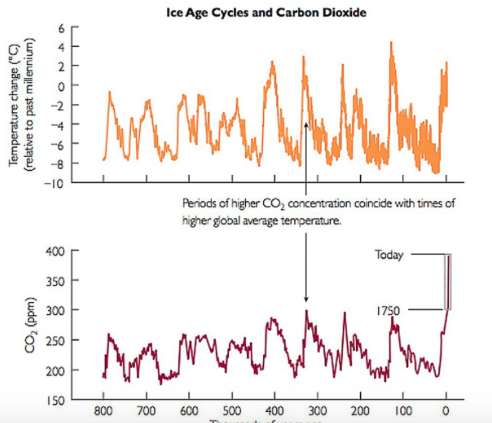Catholics: climate stewards or deniers?

This graph shows the correlation between average global temperatures and higher CO2 concentrations, which many scientists associate with global warming.
Some of us Catholics say science never contradicts religion, and climate scientists and faith leaders are reinforcing this ideology now more than ever. In fact, major religious leaders now recognize climate change as a scientific fact that many other people, including Catholics, have decided to ignore and to identify as propaganda.
“Climate change is having an effect, and scientists are telling us which path to follow,” Pope Francis said. “We have a responsibility — all of us. Everyone, great or small, has a moral responsibility. We must take it seriously [or] history will judge our decision.”
Climate change has been debated widely in society, and specifically in the Catholic Church, but the scientific fact has not wavered.
“There’s no belief involved,” said Jeffrey Bennett, who authored A Global Warming Primer. “It’s 100 percent rock solid science. I call it ‘1-2-3 science’ due to the simplicity and two facts and one inevitable conclusion drawn from those facts.”
According to Bennett, the first fact is that carbon dioxide is a greenhouse gas, which means it traps heat to create a warmer planet, like Earth or Venus. The second fact is that human activity, especially the use of coal, oil, and gas, all of which release carbon dioxide when burned, is adding significantly more of this heat trapping gas to Earth’s atmosphere.
The inevitable conclusion is we should expect the rising carbon dioxide concentration to warm our planet, with the warming becoming more severe as we add more carbon dioxide, Bennett said.
Even with all the facts and evidence in mind, many conservative Catholics still choose to deny the undeniable, harboring an arrogant trust that God will save them. Their viewpoint has instituted a reputation of ignorance that Catholics must remove in order to be taken seriously.
Fr. Patrick Wainwright, who serves as campus priest at Cathedral Catholic High School, feels the solution falls in human understanding and action.
“God helps those who help themselves,” Fr. Wainwright said. “If given the means of intelligence and capacity to speak and discern, I should use this to care for the prevention of harm to the world I live in. If I am unwilling to use the means god is giving me for the protection of society, why would he give me extra means if I’m not using the original ones he’s given?”
Research and studies regarding climate change are endless and mind-blowing.
Evidence found in ocean sediment, coral reefs, tree rings, and layers of sedimentary rock reveal current warming is occurring roughly 10 times faster than originally thought, according to climate.nasa.gov. The average surface temperature has risen roughly more than 2 degrees Fahrenheit since the 19th century in correlation with increased carbon dioxide and harmful emissions due to human activity.
Though some CCHS families and students are unaware of or disagree with science, there are many students who want to make a difference and take action.
The CCHS Environmental Club is comprised of many such activists, including Lauren Puleo ‘20.
“The awareness of students seems to be below average at Cathedral,” Puleo said. “I think a lot of people don’t really care, and [they] believe that since they are so young they can’t have much of an effect.”
Some Catholics’ unwillingness to be informed and their avoidance of science is ultimately a sin, Fr. Wainwright said. As Catholics, the common belief of being a steward of creation is disregarded by deniers of climate change.
“When ignorance is culpable it is a sin, when ignorance isn’t then it is not a sin,” Fr. Wainwright said. “If it is an ignorance, I can claim I was not aware of it, and it is not a sin. For example, when people don’t attend church and did not know that is a sin, then they are an exception.
“Someone, however, whose ignorance is culpable and knowingly sinning doesn’t go to church is obviously an example of ignorance as a sin.”
Students are open with their beliefs of declining science and voice them consistently. Many of these students, however, are just influenced by their parents, who allow their children to maintain these outdated beliefs blatantly.
“To me, the science isn’t sound enough,” CCHS student Patrick O’Brien ’20 said. “I don’t think there’s a big enough sample size and the rotation of earth and imperfect orbit can be the cause just like it used to be in ice ages and causing temporary warming.”
Though O’Brien seems to have a base understanding of how climate change works, he, in this case, is just unaware, which he recognized, and his open-mindedness and awareness of that should be commended, along with his agreement to be interviewed.
According to Bennett, the climate has seen nothing like the current change before within such a short-span, which has corresponded with human civilization.
“I have a section of my book on this very issue,” Bennett said as he presented a graph showing the extraordinary correlation of temperature changes and carbon dioxide concentration during the last 800 years.
No matter your political party, no matter your creed, and no matter your outlook, the reality of climate change is steady and must be combatted with an equivalent drive to inform and to take action so we don’t destroy the world so beautifully formed that we are privileged to live upon.
Conservatives make up the majority of climate change deniers even though the universal definition of a conservative would imply a strong advocacy for the clash against changing climate.
“What is a conservative after all but one who conserves, one who is committed to protecting and holding close the things by which we live,” former U.S. President Ronald Reagan said to the National Geographic Society in 1984. “Our countryside, our rivers and mountains, our plains and meadows and forests. This is our patrimony. This is what we leave to our children.
“And our great moral responsibility is to leave it to them either as we found it or better than we found it.”
The job of a Catholic is the same as a Muslim, an atheist, a Jew, and an agnostic – namely, to be a steward of our surroundings and to share a mutual responsibility of caring for the environment.
“Every Catholic should see all of God’s creation as a gift to be prized, one for which we care,” Diocese of San Diego Auxiliary Bishop Fr. John Dolan said. “Yes, we can use the goods of this earth for our own sustenance, but we should use these gifts in ways that minimizes harm to the environment and are as sustainable as possible. The last three pontiffs — Pope Saint John Paul II, Pope Benedict, and Pope Francis — have all spoken eloquently about our need to be responsible stewards of the earth.
“Let’s get with the program.”

Serving as Managing Editor for two years and writing more than 20 El Cid stories prepared me for the critical role of Editor-in-Chief, where I plan to...




















































